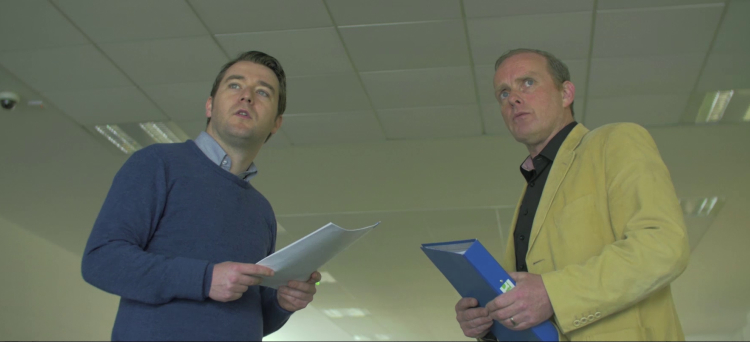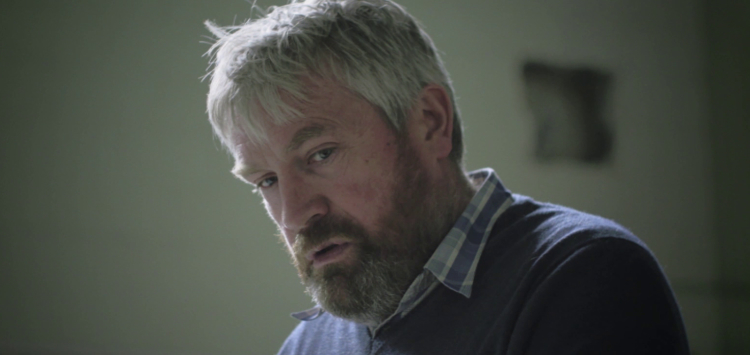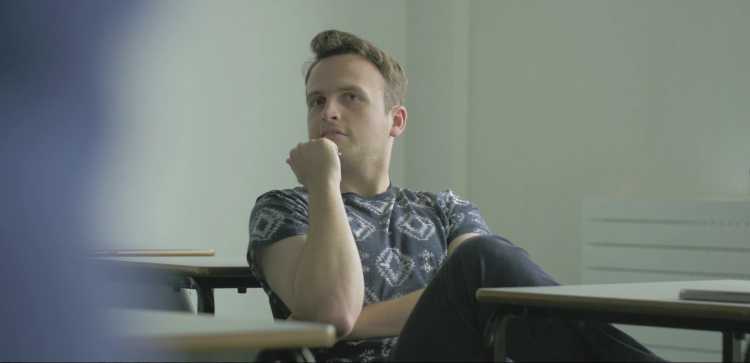An Interview with Irish Film Maker Sean Clancy on his First Feature Locus of Control
Leitrim based film maker Sean Clancy has been quietly making waves in the short film and music video scene over the past few years. Shot in 2016, his first feature Locus of Control is a dramatic step up from the short form to the long and represents his first foray into feature film making.
Blending dark existential comedy with tones of horror and heart, Locus of Control has been described at “The Shining meets a FAS Course”. But Clancy’s film talks more to the Irish experience over the tough years of the recession, and ponders on whether we control our lives or not. Locus of Control is wonderfully realized and blends these dark elements with a unique tone as the main character descends into the bowels of institutionalized bureaucracy and questions his own place in the universe.
We chatted with director Sean Clancy about his first feature.
HeadStuff: OK, so tell me a little about Locus of Control, what’s the film about?
Sean Clancy: Locus of Control is about an unemployed stand-up comedian named Andrew Egan (John Morton) who reluctantly takes a teaching job and finds his life spiraling into a version of his own personal hell.
HS: The main character Andrew seems to be suffering, like many creatives did during the recession, from not only unemployment issues, but also issues of self worth and belief. Where did the character come from?
SC: A few years ago I was on a mandatory computer course as part of claiming social welfare. It was only six weeks long but it was a very strange experience. The curriculum for the course outlined that on week three we would learn how to use a mouse and a lot of days there was a real tension in the room as a fairly broad age-range of people from different backgrounds were brought together to learn something they either already knew or had no intention of ever using.
The teacher of the class was given the unenviable position of trying to make all this work and then one day we were given a personality test called ‘Locus of Control’. Based on your answers you would get a result of ‘internal locus’ or ‘external locus’ whether you believed your life was something you had control over or whether it was something that happened to you. That idea of whether you’re in control of your life or not seemed like an interesting starting point for a story.
By making him a comedian I was able to introduce those other ideas of self worth and belief that I’ve thought about myself. Having someone standing on stage and trying to make people seems like a very vulnerable position to be in. There’s very little separation between the person and the thing they’re presenting to the world. The danger of having your self worth attached to something that’s in the hands of others.

HS: The systems in place, be it in a social welfare office or a school, are targeted in Locus of Control, with a frustrating nod to the insipid bureaucracy. The building frustration of Andrew is mirroring what many feel still about these systems. Were they that bad? Was something like job bridge not a good way for people to gain experience?
SC: I have no personal experience of being part of a job bridge placement and I think one of the reasons I was keen to make this film completely subjective, in that it’s told from Andrew’s point of view, was to avoid making some kind of treatise on the social welfare system.
I found I was more interested in a story that looks at the effects of unemployment and a sometimes confusing and condescending bureaucracy as opposed to the system itself. How it impacts on a person’s self-worth and how they view the world. At its worst, it feels like you can become institutionalised.
The longer you’re a part of any system that you’re dependent on, the smaller the world becomes, the less opportunity you see. It can create a sense of helplessness and feeling powerless without even being aware of it. I think the longer that goes on the less likely you are to be able to see where you can actually make choices and decisions, the more overwhelming and frustrating the world can start to become.
HS: Similar to some of your short films, including the award winning Cavalier, you wrote, directed, produced, shot and edited Locus of Control. How was the production and did you find it much harder stepping up to making a feature length piece?
SC: Before shooting I thought a schedule that lasted weeks as opposed to days was going to be one of the more challenging parts of the film but instead it was kind of helpful. You get to settle into the shoot and find a rhythm. I put a lot thought into planning the film beforehand so when we were shooting everything was relatively straight forward.
We didn’t have much leeway with people being free at the same time as each other so fitting a lot of stuff into one day became fairly common. All the scenes with the actors from the class were shot in one day and that makes up almost twenty minutes of the final film. I remember that felt like a long day but it’s also the most actors we had around at the same time so it was good fun too.
HS: The film is a comedy, but also a horror and a tragedy, did you find it difficult juggling these tones when writing the script and shooting?
SC: The cast play a huge part in that. From the get go people were on the same page with being able to land a certain kind of sincerity and droll humour. I remember when I was shooting being concerned that the tension or that ominous feeling wouldn’t come across but between the framing and the soundtrack that wasn’t an issue so by the time I was editing I was focused much more on the characters. There’s so many subtle performance notes from the entire cast that add a level of emotion and detail and I didn’t want to lose that to the more heightened genre elements.
HS: Watching Locus of Control, the tone and bleakness reminded me of a number of films and film makers, notably Yorgos Lanthimos’ work, Ben Wheatley’s High Rise, even parts of it reminded me of Aronofsky’s Requiem for a Dream. What were your influences for the film and how it looked and felt on screen?
SC: I really like Yorgos Lanthimos’ films and I definitely had those slightly distant allegorical horror/thriller films that people like Heneke and Lanthimos make in mind before shooting. We would have finished shooting a few months before High Rise came out but I’m a big fan of Ben Wheatley films, like Aronofsky there’s always an interesting mix of genres going on in service of darker character driven stories.
From a script point of view, the Coen Brothers were definitely a point of reference. They’re amazing at writing elliptical, existential stories filled with humour. They’re great at building meaning from repetition and background detail so I was interested in playing with that too.
HS: John Morton and Seamus O’Rourke put in remarkable performances. How did they contribute to the characters final appearance in the film?
SC: I cast John Morton as the lead because I knew he’d do a great job. He’s got great comic timing and he’s able to carry things in a really subtle way. The character as written is quite internal and John is able to communicate so much non verbally that it really brings the Andrew to life.
I cast Seamus O’Rourke after seeing a one man play that he’d written and performed. I sent him the script hoping he’d say yes because as soon as I saw him I found it hard to imagine anyone else playing the part. There’s a humour and innocence that Seamus is able to make work really well but he brings a wonderful soulful quality that’s all his own.

HS: The music is a key component of the film and influences the mood and tone throughout. How did you and composer Callum Condron come up with the style of the music?
SC: I sent the script to Callum alongside music I’d be listening to as a reference point, some Carter Burwell and pieces from The Shining. The main things to get across were the feelings of mystery and tension. Callum sent me on the first tracks before I’d even started shooting and right away I could picture the scenes. He did an incredible job.
HS: You have worked with Callum before and also with Peter McGann and Aoife Spratt in Cavalier. Are you building a team you work well with and how does this help in making independent films in Ireland?
SC: They’re very gifted people that I really like so I want to work with them as much as possible. I think when you have talented, reliable people that are fun to be around it helps making any film. Things become easier.

HS: What do you hope people take away from the film?
SC: In my head the film is about choice, decision and perception so I’m curious to see what other people take away of their own accord.
HS: Outside of Locus of Control you shoot and edit a lot of music videos for a number of groups. I noticed you have recently been nominated for a Young Directors Award for you outstanding music video for Super Silly’s Not Ready to Leave. That video is starkly different in style to Locus of Control in terms of its stylized nature. Do you like doing different projects and exploring the medium as much as you can?
SC: Being able to jump around between different styles and ideas is lots of fun. It was definitely nice to do something completely different after planning, shooting and editing the one project for so long. It feels good to try different approaches or styles, you always learn something that you take onto the next shoot.
HS: What new projects do you have down the pipeline and how do you want to build on the success of Locus of Control?
SC: There’s another script I’d like to make that I’ve been working on, but before that there’s more music videos on the way.
Locus of Control is being screened as part of the International Silk Road Film Festival on Wednesday 7th March, 8.15pm at Filmbase. Tickets €5, available on the door.
For more information, click here.
You can check out more of Sean’s work here.

